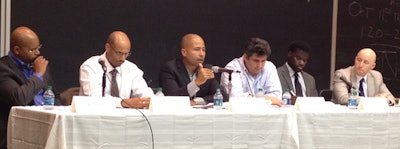 Panelists discuss keys to uplifting the incarcerated Black male populace.
Panelists discuss keys to uplifting the incarcerated Black male populace.Transparency and education are the best ways to start changing the effects of mass incarceration on voting rights in the United States, concurred a panel of experts at a session at the Seventh Annual Black Male Initiative Conference at the City University of New York’s College of Staten Island.
“Unfortunately, we are at the tail end of a huge failed experiment in mass incarceration, and I’m not sure how we turn around this ship in a short amount of time,” said Glenn Martin, vice president for development and public affairs at The Fortune Society, a nonprofit that specializes in prisoner reentry into society. “We have 5 percent of the world’s population, but 25 percent of the world’s prisoner population.”
At Friday’s gathering, Martin stated that mass incarceration traces back to just after the civil rights movement, noting that it has spiked and continued to climb in the last 40 years for Black males, Latinos, and Black women. It’s no longer about denying African-Americans the right to vote, but about barring those who have been incarcerated the right to vote, he explained. In addition, more behavior is being criminalized than even 10 or 15 years ago.
“There’s the law, and then there’s the chilling effect from the law, which disenfranchises way more people than law itself,” said Martin.
During the session “Voting Rights in an Age of Mass Incarceration: Restoring the Rights of Formerly incarcerated People” in a lecture hall at the school’s Performing Arts Center, Martin and several other speakers specified that the public knows very little about how prison sentences affect the lives of individuals and how the system works against them when they come out, too. There are about 2.3 million people in prison across the country, said Martin, but you can go your entire life without ever knowing a prisoner. Some states like New York offer protections against the discrimination former inmates face in the hiring process, but others don’t. “You don’t have protections in other states around the country,” he noted.
Even so, some colleges and universities close the doors on those convicted of certain crimes. “There are some institutions in New York State that say, ‘If you have a felony, you can’t even apply here,’” said Martin. Many schools also keep those with criminal records from fully participating on campus, even if they allow them to enroll, by declaring that those individuals must immediately leave school grounds once their classes are over.
Evan Misshula, a Ph.D. candidate at the CUNY Graduate Center and John Jay College of Criminal Justice, said that, after he was incarcerated at a minimum security prison, he was prohibited from going to places like The Fortune Society or The Osbourne Association, which help people assimilate back into society, because they are staffed by former inmates and those on probation or parole have to stay away from other former criminals. Families are often split apart because of this and the reentry process is inhibited, said Misshula.
Having tens of thousands of dollars in backed child support or income taxes also cripples newly released individuals from engaging in the banking system or participating in society financially, Misshula added. This also can lead to warrants, which then keep people from going to the polls. “Poor people don’t vote because their interaction with the government ends up with something bad happening,” he said.
Policymakers are also afraid to take the side of formerly incarcerated people because it’s not a popular cause and it doesn’t garner votes.
“This is the most partisan issue I’ve ever worked on,” said Martin, noting that he has worked on bills in New York State for more than a decade.
All in all, education about the laws and how the system works is key in breaking down barriers. “Our criminal justice system does a good job of being non-transparent,” said Martin. “Even before we change policy, there is a lot we can do to empower people through education alone.”















